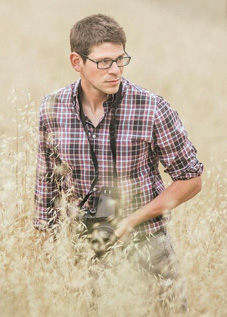Huntington Photographer Turns Lens On 'Alternative' South
/Lucas Foglia’s images of families living sustainably and independently in the South is featured in an exhibit and accompanying book, “Southbound.” Among the photos, “Andrew and Taurin Drinking Raw Goat's Milk” was shot in Tennessee during 2009. Photos by Lucas Foglia
By Sophia Ricco
sricco@longislandergroup.com
Huntington Station native Lucas Foglia is documenting an evolving vision of the South with his photographs that depict a modern counterculture movement.
Having grown up on his family’s Fox Hollow Farms, Foglia has been drawn to nature and sustainability from a young age. After receiving a degree in art from Brown University and MFA in photography from Yale University, Foglia hit the road in the South finding families who live self-sufficiently. Like Foglia’s family, who grew a major portion of their food and bartered their goods with others in exchange for local products and service, these families rely on themselves for their own sustenance.
“The lifestyle we had was a mixture of agriculture and suburbia,” Foglia said. “When I went to photograph in the South East, the people I met were living with the same value system that I grew up with, but to more of an absolute.”
Foglia’s work will aid the visualization of the region through the Halsey Institute of Contemporary Art exhibit and accompanying book, “Southbound: Photographs of and about the New South.” A collaboration of more than 50 photographers, the traveling exhibit will hang in Charleston, SC; Raleigh and Durham, NC; Chattanooga, TN; Meridian, MS; and Baton Rouge, LA.
Foglia titled his piece of the project “Natural Order.” It shows a contemporary counterculture movement from the region. “Some people might remember hippie communes in the ’60s and ’70s,” he said. “My project in the context of this show illustrates the communities that are thriving today.”
“Rita and Cora Aiming” was shot in Tennessee during 2007.
The project took Foglia five years to complete. He photographed around a dozen communities in Virginia, Tennessee, North Carolina, Kentucky and Georgia. Foglia was enchanted by the landscapes and beauty, but even more fascinated by the lifestyles.
“When there were early signs of the global economic recession, I was interested in photographing people, who had chosen to live as self-sufficient a lifestyle as possible,” Foglia said.
Foglia’s mother, storyteller Heather Forrest, connected him with fellow storyteller Doug Elliott, who made the introduction to a network of people who had left cities and suburbs to take up life “off the grid.”
“Motivated by environmental concerns, religious beliefs, or the global economic recession, they chose to build their homes from local materials, obtain their water from nearby springs, and hunt, gather or grow their own food. All the people in my photographs aspire to be self-sufficient,” Foglia said.
Detached from the outside world, the people in these communities maintain a self-sufficient lifestyle.
“Todd after a Haircut” was taken in North Carolina during 2008.
“I was fascinated that as the recession went into full force, the people I was photographing were unaffected,” Foglia said. “They lived independently from the mainstream economic system.”
Each community Foglia captures has its own habits and practices. Some families choose to live in wigwams made of entirely tree bark; others -- former nuclear engineers – dressed and acted like Mennonites.
“The families I photographed in North Carolina were practicing earth skills,” Foglia said. “Tanning and wearing animal hides for clothing, starting fires by friction, hunting and gathering their food. The families in Tennessee and Kentucky were focused on living in the fashion of Mennonites, off-grid and survivalist, but more agrarian.”
America’s South East is an ideal region for families to live self-sufficiently without needing much money, thanks to its cheap land, fresh water springs, long growing seasons, the availability of deer for hunting, and philosophy of freedom.
“It was easy to have an alternative lifestyle without interference from the neighbors,” Foglia said. “Locals believed in independence, libertarianism, live-and-let-live.”
Photographer Lucas Foglia’s images of families living off the grid in the South are featured in the exhibit and accompanying book, “Southbound.”
The photographs taken during Foglia’s time with the communities give an immersive look at the world of sustainability, from a mother teaching her daughter how to shoot a gun, to a young boy looking at his new haircut in the reflection of a river. Foglia’s dynamic images feel natural and instinctive.
“They’re moments that happen in everyday life,” Foglia said. “I am actively photographing and the people I photograph know that I’m there.”
Foglia will continue his journey to explore humans’ connection to nature in a wired world with future projects. Currently, he lives in San Francisco and just completed his third book, “Human Nature.”
To learn more about “Southbound” and view the exhibit, visit southboundproject.org.









